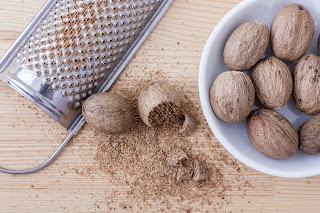Nutmeg Jaiphal - The Best Natural Antibiotic
Nutmeg jaiphal is a spice that has been used in traditional medicine for centuries. It is only recently, however, that science has started to catch up and study the potential health benefits of this spice. One of the most promising findings is that nutmeg jaiphal may be a natural antibiotic. In this blog post, we will explore the evidence for this potential health benefit and discuss how you can use nutmeg jaiphal to fight infection.
What is nutmeg jaiphal?
Nutmeg jaiphal is a natural antibiotic that has been used for centuries to treat a wide variety of ailments. It is made from the dried seed of the nutmeg tree and has a wide range of medicinal properties. Nutmeg jaiphal is an effective antibacterial agent that can kill a variety of bacteria, including those that cause pneumonia and sepsis. It is also a powerful antifungal agent and can be used to treat fungal infections such as candida. Additionally, nutmeg jaiphal is an antioxidant and anti-inflammatory agent that can help to reduce inflammation throughout the body.
Nutmeg jaiphal as an antibiotic
Nutmeg is one of the most popular spices in the world. It has a warm, slightly sweet flavor that goes well with many dishes. But did you know that nutmeg also has powerful medicinal properties?
Yes, nutmeg jaiphal is an excellent natural antibiotic. It can help fight bacterial infections and speed up healing. Nutmeg jaiphal is also a strong anti-inflammatory agent. This spice can be used to treat various conditions like acne, arthritis, and stomach ulcers.
To use nutmeg jaiphal as an antibiotic, simply add it to your food or take it in capsule form. You can also make a paste by mixing nutmeg powder with water. Apply this paste on the affected area three times daily. For best results, use fresh nutmeg powder rather than the pre-ground variety.
How to use nutmeg jaiphal
Nutmeg jaiphal has been used for centuries in traditional medicine as a natural antibiotic. It is effective against a wide range of bacteria, including those that cause food poisoning and respiratory infections. Nutmeg jaiphal can be taken internally or applied externally to the skin.
When taking nutmeg jaiphal internally, it is important to start with a low dose and increase gradually as needed. The recommended dose is 1-2 grams per day. Nutmeg jaiphal can be taken in capsule form, added to food or drinks, or made into a tea.
Externally, nutmeg jaiphal can be applied to the skin in the form of a paste or ointment. It is often used to treat acne, boils, and other skin infections.
If you are pregnant or breastfeeding, consult your healthcare provider before taking nutmeg jaiphal.
Jaiphal for babies during Winter
Winter is the ideal time for babies to start using jaiphal. Jaiphal is an Ayurvedic herb that helps keep the body warm and is especially beneficial for infants during cold weather. Not only does jaiphal help keep babies warm, but it also has many other benefits for their health. Jaiphal is known to improve digestion, relieve gas, reduce colic, and boost immunity. It’s also a great way to get your baby to sleep through the night. If you’re looking for a natural way to keep your baby healthy and comfortable this winter, jaiphal is the perfect solution.
Why use Jaiphal for babies during winter?
During winter, our bodies need extra care and attention. The cold weather can cause a range of issues, such as dry skin, chapped lips, and a weakened immune system. That's why it's important to take steps to protect yourself and your family during this time.
One way to do this is by using Jaiphal for babies during winter. Jaiphal is an Ayurvedic herb that has numerous benefits for both adults and children. It's known to improve circulation, boost immunity, and soothe the skin.
When used topically, Jaiphal can help to relieve dryness, itchiness, and inflammation. It's also been shown to speed up healing time for wounds and cuts. And because it's packed with antioxidants, Jaiphal can help to protect the skin from damage caused by free radicals.
So if you're looking for a natural way to keep your baby safe and comfortable during winter, try using Jaiphal oil or powder. You'll be glad you did!
How to use Jaiphal for babies during winter?
During winter, babies are more prone to colds and coughs. Jaiphal can be used to help relieve these symptoms. Jaiphal oil can be added to a diffuser and inhaled, or diluted with a carrier oil and applied topically to the chest and back.
Are there any side effects of using Jaiphal for babies during winter?
There are no known side effects of using Jaiphal for babies during winter.
Nutmeg jaiphal side effects
While nutmeg jaiphal is generally safe when used in small amounts, it can cause side effects when used in large doses. The most common side effect is nausea, which can be accompanied by vomiting and diarrhea. Other less common side effects include dizziness, headache, and seizures. If you experience any of these side effects, stop using nutmeg jaiphal and consult your healthcare provider.
Conclusion
Overall, nutmeg jaiphal is an incredibly versatile and effective natural antibiotic. Its wide range of uses makes it a valuable addition to any home medicine cabinet, and its potent antibacterial properties make it a powerful weapon against infection. If you're looking for a natural way to fight infection, nutmeg jaiphal is definitely worth considering.



No comments: